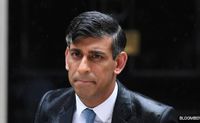On May 7, 2025, former UK Prime Minister Rishi Sunak publicly supported India's military operation, dubbed 'Operation Sindoor', which targeted nine terrorist sites in Pakistan and Pakistan-occupied Jammu and Kashmir. This operation was a direct response to a recent terrorist attack in Pahalgam, Kashmir, that resulted in the tragic deaths of 26 individuals, including a Nepali national.
Sunak took to the social media platform X (formerly Twitter) to express his views, stating, "No nation should have to accept terrorist attacks being launched against it from land controlled by another country. India is justified in striking terrorist infrastructure. There can be no impunity for terrorists." This strong endorsement from a prominent British politician underscores the international ramifications of the ongoing conflict between India and Pakistan, particularly in the wake of such violent incidents.
The Indian Ministry of Defence confirmed the operation, revealing that it involved the launch of 24 missiles targeting terrorist facilities linked to groups such as Lashkar-e-Taiba, Jaish-e-Mohammed, and Hizbul Mujahideen. The strikes were executed in a swift 25-minute timeframe, resulting in the deaths of approximately 70 terrorists and injuring around 60 others. Key targets included known terror hubs in Bahawalpur and Muridke, the latter being infamous for its role in training the attackers of the 2008 Mumbai attacks.
Sunak's comments came as tensions escalated following the Pahalgam attack, which he condemned as "barbaric." He expressed solidarity with the victims' families, emphasizing that the UK stands with India in its fight against terrorism. He reiterated, "Terror will never win. We grieve with India," highlighting the emotional weight of the tragedy.
In addition to Sunak, support for India's actions was echoed by Reuven Azar, Israel's Ambassador to India, who stated, "Israel supports India's right to self-defence. Terrorists should know there's no place to hide from their heinous crimes against the innocent." This endorsement from Israel adds another layer to the geopolitical dynamics at play, as both nations face similar threats from extremist groups.
However, the operation has not gone without criticism. The Pakistani government condemned India's missile strikes as an "act of war" and responded with shelling across the Line of Control, resulting in civilian casualties on both sides. Reports indicate that at least 26 individuals, including children, have died as a result of the escalating violence. Pakistani officials claim that Indian aircraft were downed during the confrontations, further complicating the situation.
UK Trade Secretary Jonathan Reynolds emphasized the need for de-escalation between the two nuclear-armed neighbors, stating that the UK is prepared to facilitate dialogue. He remarked, "Our message would be that we are a friend, a partner to both countries. We stand ready to support both countries. Both have a huge interest in regional stability, in dialogue, in de-escalation, and anything we can do to support that, we are here and willing to do." This statement reflects the UK's cautious approach to the rising tensions, advocating for peaceful resolutions.
In Parliament, Labour leader Keir Starmer called for calm, expressing serious concern over the situation. He urged both nations to engage in direct dialogue and protect civilians caught in the crossfire. Starmer's stance highlights the delicate balance that must be maintained in international relations, especially regarding conflicts that could escalate into broader confrontations.
As the situation unfolds, the international community watches closely. The United Nations has called for restraint from both India and Pakistan, warning that any further escalation could have dire consequences not just regionally, but globally. UN Secretary-General Antonio Guterres emphasized that the world cannot afford a full-scale war between two nuclear powers.
India's Ministry of Defence described the strikes as "focused, measured, and non-escalatory in nature," asserting that no Pakistani military facilities were targeted in the operation. This claim aims to alleviate fears of an all-out conflict while maintaining the narrative of a justified military response to terrorism.
In the wake of these events, the broader implications of Operation Sindoor and the subsequent reactions from various governments highlight the intricate web of alliances and tensions in South Asia. The ongoing conflict between India and Pakistan remains a critical concern for regional stability, and the international community's response will be pivotal in shaping the future of these relations.
As both nations navigate this precarious situation, the hope remains that dialogue and diplomacy will prevail over violence and retaliation. The world watches closely as the events unfold, acutely aware that the stakes are higher than ever in this complex geopolitical landscape.






